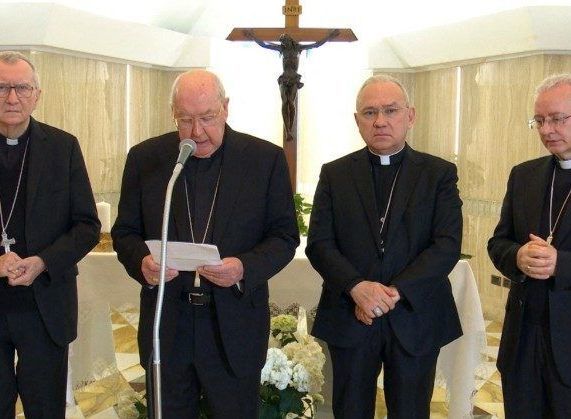Teresa Deevy’s grandniece and literary executor Jacqui Deevy and the Mint Theater Company’s Jonathan Bank outside the playwright’s home on Passage Road, Waterford.
By Orla O’Sullivan
You may not have heard of a woman from Waterford who was in her day considered the playwriting equal of Sean O’Casey.
This week, Teresa Deevy’s “Katie Roche” returns to the Abbey Theatre stage after an absence of 42 years, thanks in part to the Mint Theater Company, New York.
Meanwhile, the Mint, which has run a long campaign to restore Deevy’s artistic reputation, is staging several of her short plays that have never previously been seen. It has also just published a book of Deevy’s short plays that includes those works.
And so, you don’t have to travel to Dublin to see Deevy’s forgotten plays. They are running at The Beckett Theatre on Theatre Row until Sept. 30, in a collection entitled, "The Suitcase under the Bed."
Initially upon hearing the title, I presumed it to be playwright’s own and thought, “Wow! Deevy was really ahead of her time, with her allusions to the subconscious and, in particular ‘emotional baggage’ before the term existed.”
Actually, the show is so named because the Mint's artistic director Jonathan Bank found the unknown plays stashed in a case under a bed, when he made a pilgrimage to the family home in Waterford City.
Deevy’s name surfaced as Bank researched the Abbey’s early production history, having realized he “could not think of a hugely successful female Irish playwright after Lady Gregory.”
As a woman in the 1930s, Deevy was remarkably successful in having six of her plays produced by the National Theatre of Ireland and she was one of four playwrights, O'Casey and Synge among them, whose work was included in the Abbey's tour of the U.S. in 1937.

Teresa Deevy.
Deevy was doubly unusual in that she was deaf throughout her adult life. She was born in 1894, the youngest of 13 children in a prosperous family in Waterford. After attending the Ursuline Convent in her native city, she went to study at University College Dublin in 1913. That year, she was diagnosed with Ménière's disease, a disorder of the inner ear. She moved to University College Cork to be close to specialists and then for a number of years to London where she learned lip-reading. She frequented theatres to help with that process.
Deevy returned to Ireland in 1919, where she began her writing career and also joined the revolutionary Cumann na mBan. In independent Ireland, she was critical of censorship and Catholic views of the role of women.
After she fell out of favor with the Abbey in the late 1930s, she wrote prolifically for Raidió Éireann and the BBC.
Deevy, who died in 1963, never married. Perhaps the wild spirit Annie in “The King of Spain’s Daughter,” one of the Mint’s four shorts, speaks for Deevy for when says, “I couldn’t bear that I’d be no more than any man’s wife.”
In Deevy’s time, Banks notes, “The options for a woman once she marries are zero. You have to give up your job. There’s no divorce and no contraception.”
The gritty “King of Spain,” the only play previously produced, is a counterpoint to the three Bank discovered in the Deevy ancestral home. They have some echoes of Oscar Wilde’s comedy-of-manners among the well to do. But Deevy’s plays have feminist undertones beneath the charm.
As for Waking The Feminists, the 2015-founded protest movement sparked by female under representation in the Abbey’s 2016 centenary program, the Mint’s Bank said, “They were late to the party.” (New Abbey management following the WTF uproar decided on the current Deevy production.)
The Mint began in 2009 to give Deevy her due. Since then, it has staged and produced videos of three full plays, and published them in “Teresa Deevy Reclaimed Volume One.” Last month, came 10 shorts, in volume two.
It’s unusual for a theatre to publish books, but Bank, who began the practice, says it’s not that expensive given the voluntary labor. It’s important, he noted, because “people produce what they study.”
Mint gives the books to educational institutions, such as Fordham, where one of his co-editors on the Deevy volumes, John Harrington, is an English professor.
The other co-editor, Professor Christopher Morash, instituted a Deevy archive in NUI Maynooth. Ivy League universities in the U.S. were reportedly interested in buying the Deevy collection, “but Ireland wanted to keep it,” Bank said.
Sadly, the 200-year old family home on Passage Road, where Deevy’s work lay hidden, is for sale.
Deevy’s grandniece and literary executor, Jacqui Deevy, who led Bank to the suitcase, is coming to speak at a Mint event on Sept. 9.
It’s all part of the biggest effort for any playwright by the Mint, whose raison d’etre since Bank took over in 1996 has been to stage neglected work.
Bank’s director’s note classifies Deevy as “undoubtedly the most brilliant playwright whose work I will ever have the privilege of re-introducing to the world.” How so? For one, he said, “her work is unpredictable yet absolutely believable.”
To this observer, however, Deevy’s short plays don’t quite match up when compared with the rich tapestry of a full-length O’Casey play, yet they certainly have enough merit to welcome an author sidelined for so long back to the center stage.
"The Suitcase under the Bed," a collection of shorts by Teresa Deevy, staged by Mint Theater, runs through Sept. 30, at the Beckett Theatre, 410 West 42nd St. More at minttheater.org








